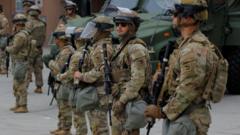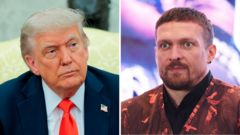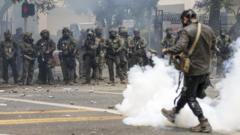As protests erupted in Los Angeles against ICE actions, Trump quickly intervened, federalizing California National Guard troops and asserting that law and order must prevail. While his base applauds this decisive action, critics warn that it could exacerbate tensions and lead to further unrest.
Trump's Swift Response to LA Protests: Political Strategy or Necessary Action?

Trump's Swift Response to LA Protests: Political Strategy or Necessary Action?
Trump's deployment of the National Guard amid protests raises questions about law enforcement and civil rights.
In a significant move on Sunday, President Donald Trump reacted swiftly to protests in Los Angeles against Immigration and Customs Enforcement (ICE), a decision that appears to align with his broader campaign promise to combat "left-wing lawlessness" in America. Despite claims from the Los Angeles Police Department (LAPD) that most demonstrations remained peaceful, the administration characterized the protests as a serious threat, citing reports of violence directed toward immigration agents.
Homeland Security Secretary Kirsty Noem emphasized the need for timely law enforcement response, noting delays in LAPD's engagement during what she classified as violent protests. This prompted Trump to federalize 2,000 troops from the California National Guard without the support of state Governor Gavin Newsom. The administration also placed U.S. Marines on standby for potential deployment, signaling an approach that deviates from past practices regarding military involvement on domestic soil.
Trump's administration is positioning itself to capitalize on its perceived commitment to law and order, framing aggressive immigration enforcement as a rallying point to galvanize his supporters and possibly sway independents concerned about public safety. Noem compared the current situation to the protests in Minnesota in 2020, insisting the administration would not allow the unrest to extend unchecked.
However, Democratic leaders have voiced strong opposition to the rapid militarization of immigration enforcement, criticizing the president's methods as inflammatory and unnecessary. New Jersey Senator Cory Booker condemned the deployment as a departure from long-standing traditions of restraint and argued that Trump's actions might be prompting more unrest among peaceful protesters who feel targeted for simply participating in lawful demonstrations.
As the summer unfolds, with a history of widespread protests, it remains uncertain whether these events will remain isolated incidents or signify the onset of widespread civil disturbances. Trump's quick intervention reflects a calculated strategy in the political landscape, one that could lead to further national debate over the role of federal law enforcement in American civil rights and public order.
















